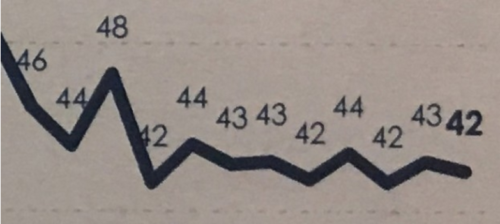
The standard of mainstream political journalism in New Zealand is worse than school newspaper level. This is not because of a lack of English language skills, but because our journalists are bought-and-paid-for whores who will say absolutely anything if the price is right. Examination of a recent propaganda piece on Newshub shows how dire the situation is.
Patrick Gower, who wrote the article, is well representative of the kind of arse-licker that infests the New Zealand Lugenpresse. Enchanted by wealth, Gower has produced a piece intended to create the impression that the conservative National Party is doing a great job of governing and should be re-elected later this year.
Referring to supposedly leaked poll results which “show [Labour] is in big trouble, two-and-a-half months out from the election,” Gower has penned a piece intended to give the impression that the Labour Party is falling to pieces (and, by elimination, National must be the best choice for running the country).
Gower writes that “National is chugging along as usual – currently on 42 percent”, but this statement is absolutely false on its face.
National has no real coalition partners, apart from the “Hemorrhoid of the House” Peter Dunne, the fake libertarian David Seymour and the race traitors in the Maori Party. These three groups only draw five seats between them, which required National to win 47% of the vote in the 2014 General Election to have the numbers to govern.
So 42% is far from “chugging along as usual” – in fact, it represents a fall in support which would see it kicked out of power if an election were to be held today.
Gower writes about a “fascinating trend” from the last six months, in which “Labour is crashing down and is at pretty much its lowest point since Andrew Little took over after the last election.”
So poor is the level of political journalism in this country that the graphics supplied for the article contradict Gower’s own statement. The natural oscillations of the poll results suggest that Labour is currently in a lull – but the graphic in the same article shows that they were on 26% six months ago, and are on 26% now.
Considering that Labour won only 25% at the last election, it’s apparent that Gower has deliberately selected an extremely small section of the polling graph and omitted the rest, in order to give the impression that this short-term fluctuation is really a major trend.
The very same graphic shows that support for National is, in fact, crashing down – from 51% as recently as the start of the year to 42% now.
So even though the line graphs supplied in the article show that National has fallen 9% since the start of the year and that Labour has remained steady, Gower, in his shameless, ham-fisted propagandising, has spun things to make it sound as if the exact opposite is true.
Unfortunately, this is the standard of political journalism in New Zealand. Presstitutes take corporate money to write propaganda pieces favouring moneyed interests, and then these lies are pumped through the national consciousness via every possible medium, until every retard in the country bleats them out mindlessly all day.
Worst of all is that the more dishonest a journalist is, the more likely they are to be given a public platform, for the reason that this dishonesty means profit for those pushing the propaganda.



